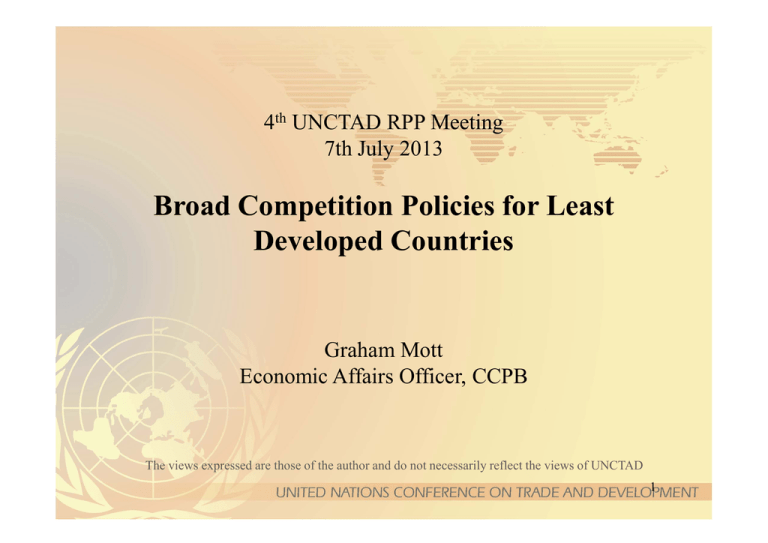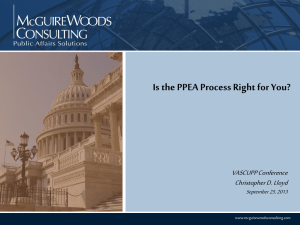Broad Competition Policies for Least Developed Countries 4 UNCTAD RPP Meeting
advertisement

4th UNCTAD RPP Meeting 7th July 2013 Broad Competition Policies for Least Developed Countries Graham Mott Economic Affairs Officer, CCPB The views expressed are those of the author and do not necessarily reflect the views of UNCTAD 1 Background • 192 Member States of the United Nations. • 122 Member States have enacted some form of Competition Act, regulating anti-competitive business practices. • 118 Member States have established some form of Competition Authority Around 40 percent of Member States have neither a competiton law nor authority. 2 Background Why? • Lack of professional resources • Lack of economic resources • Lack of political will • Lack of suitable support environment Around 40 percent of Member States have neither a competiton law nor authority. 3 What is Competition Policy? Broad sense All policies relevant to competition in the market, i.e. trade policy, regulatory policy and government policies aimed at addressing anti-competitive policies of enterprises, public or private Narrow sense Laws and policies governing the anti-competitive behaviour of enterprises 4 Government Policies Other Deregulation and privatization Trade Industrial FDI and Consumer Policies Policy Policy Capital Protection eg. SMEs, IPRs, flows Policy environment, Sectoral regulations energy Link with: Competition Law and Policy 5 Why is Competition Policy important? Competition policy can: • play a vital role in assisting developing countries in strengthening market-supporting institutions and implementing inclusive development strategies. • ensure that free markets provide opportunities that both businesses and the poor can to benefit from. • play a key role in any market-oriented economic reform and pro-poor development strategy; especially in relation to UNCTAD’s Post-2015 development agenda. Broad competition policy can ultimately feed into narrow competition policy; provides a foundation. 6 What this project proposes to do Focus on a number of key areas: • Public Procurement • Privatization • Sectoral Regulations • Corporatisation of State Owned Enterprises • The effects of broad competition policy on governance Survey of • International framework of rules and guidelines • National rules, guidelines and practices, including case studies 7 Public Procurement Public procurement accounts for up to 30 per cent of GDP in developing countries Often higher for countries lower down the development scale In practice, ideal level of competition is not always realized due to: (i) the regulatory framework; (ii) market characteristics; (iii) collusive behaviour of bidders, (iv) corruption and (v) further factors. 8 Public Procurement International Framework • (i) Model law on procurement of goods, construction and services of the United Nations Commission on International Trade Law; • (ii) The Plurilateral Agreement on Government Procurement (GPA) of the World Trade Organization; • (iii) Procurement Procedures under World Bank 9 Thank you for your attention graham.mott@unctad.org 10








